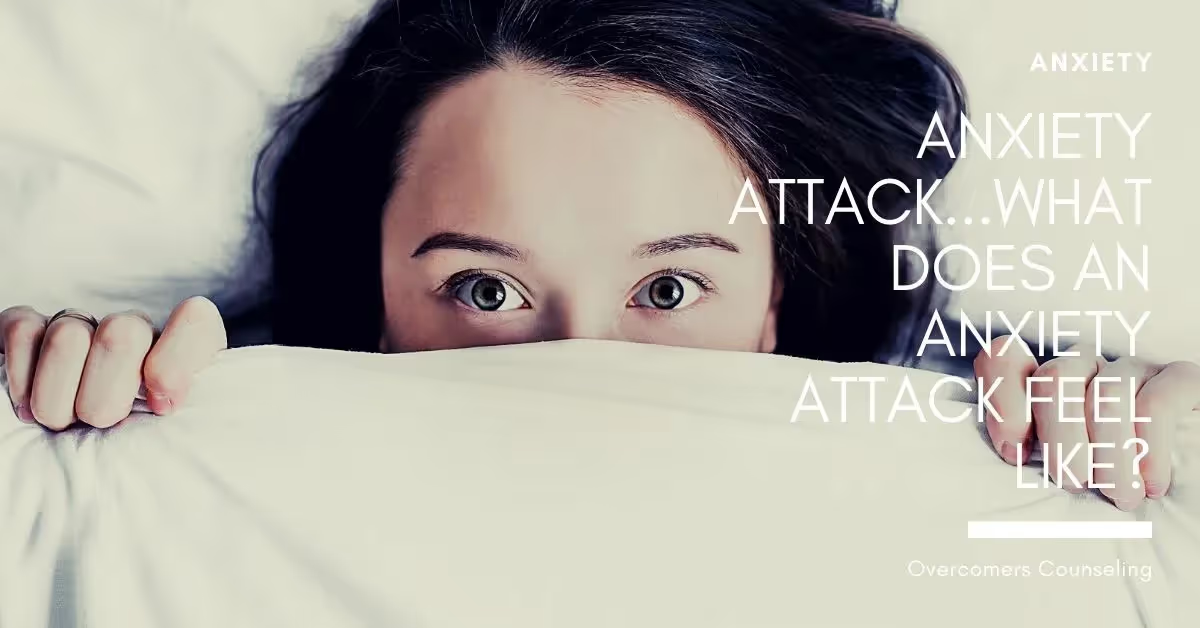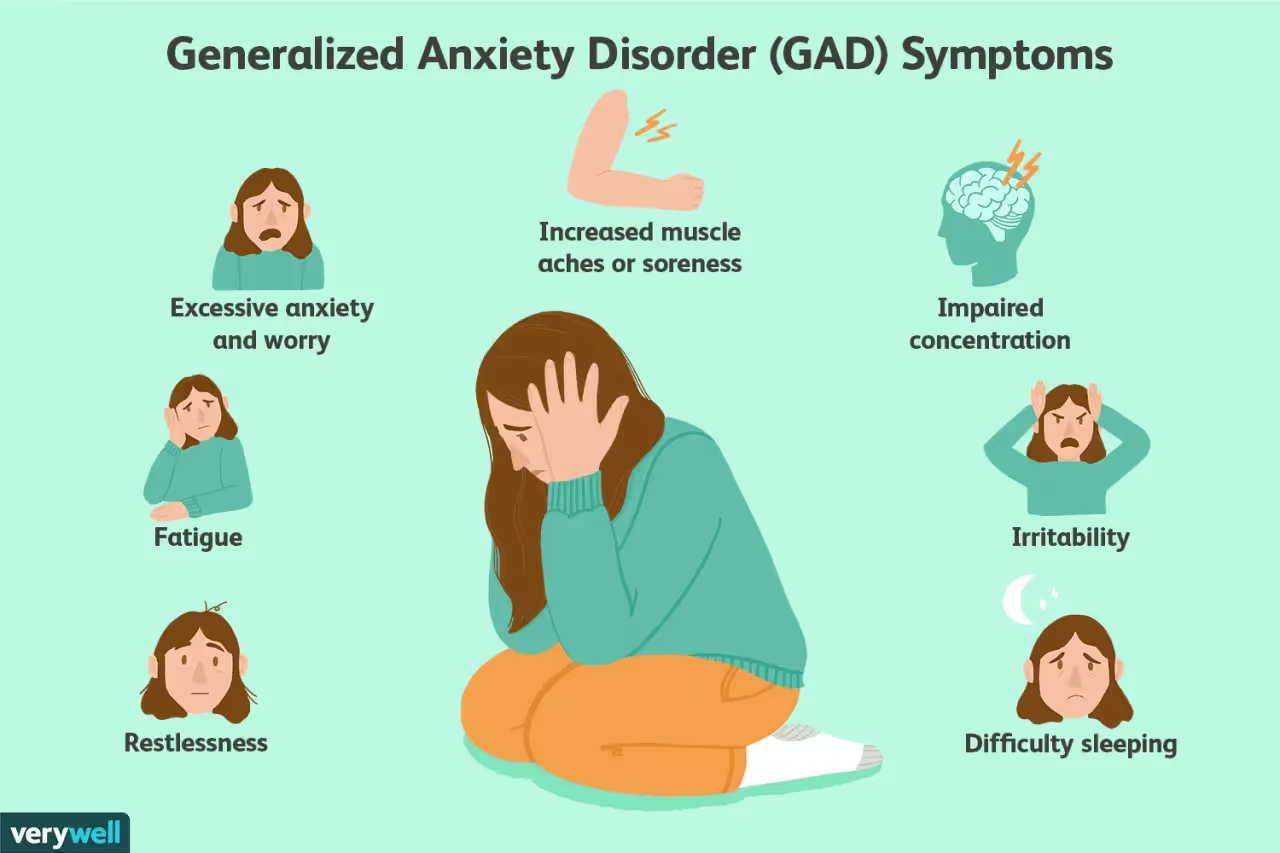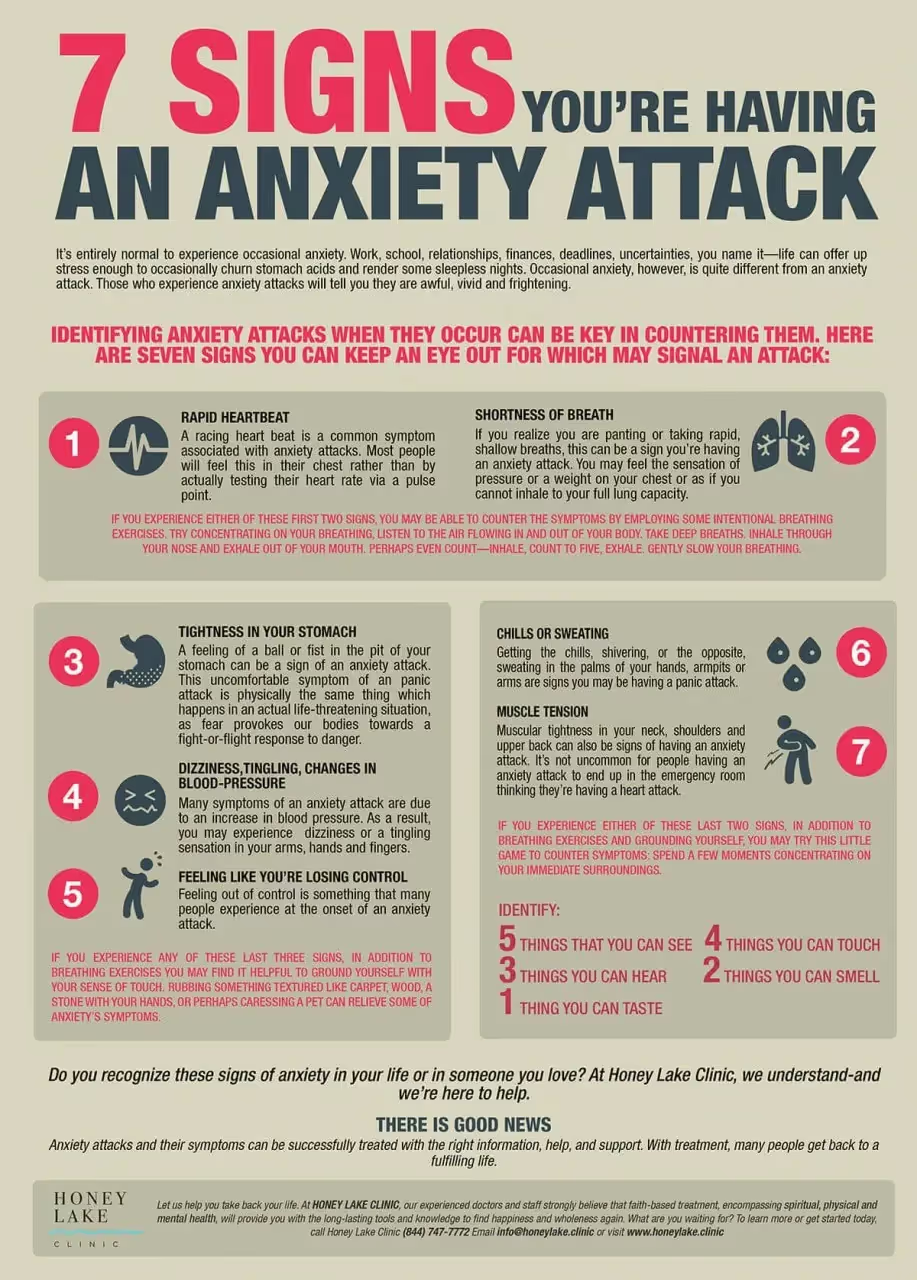What does an anxiety attack feel like exactly? These are some of the common symptoms of an anxiety attack and how to treat them.

TL;DR: If you’re wondering, “What does an anxiety attack feel like?”, you’re not alone—these episodes can be intense, scary, and surprisingly physical, even though they aren’t dangerous. This guide explains the symptoms of an anxiety attack, why they happen, and how to tell the difference between an anxiety attack vs panic attack.
Anxiety attacks can be frightening, overwhelming experiences for people who experience them, but what does an anxiety attack feel like exactly?
The simple answer: it can feel intensely physical and mentally terrifying, even when there is no real danger.
We’re here to help break down the most common (and sometimes weird physical symptoms of anxiety), why they happen, how long anxiety attacks typically last, and how to tell the difference between an anxiety attack vs panic attack—so you can feel less scared and more in control.
Even though anxiety attacks feel dangerous, they are not physically harmful. Still, the body’s alarm system can make you feel like you’re dying, losing control, or going crazy.
Understanding the symptoms of an anxiety attack helps reduce fear and makes an episode easier to manage.

Source: Verywell
Many anxiety attacks begin with a sensation of not being able to catch one's breath.
This feeling can occur even when an individual is at rest or seemingly calm. Those who experience shortness of breath as a result of an anxiety attack often feel as if they suddenly cannot fully expand their lungs and "get a full breath". As a result, they will often begin to hyperventilate, which leads to further feelings of breathlessness, as well as other symptoms, such as a "pins and needles" sensation in the extremities and feeling as if one is about to faint.
Important note: anxiety-related shortness of breath is usually caused by too much oxygen from over-breathing, not too little. Slow, deliberate breathing can reverse this cycle.
Another common symptom of anxiety attacks is a racing or rapid heartbeat.
Individuals experiencing an anxiety attack may find their heart rate skyrocketing without any apparent reason. In the midst of an anxiety attack, it is not uncommon for the resting heart rate to reach levels of 120 beats per minute, or even more. This is due to the release of adrenaline that comes with anxiety attacks.
This happens because your body enters fight-or-flight mode. The threat feels real, even if it’s only perceived, causing a surge of stress hormones.
Tingling in fingers, toes, lips, or face can be one of the weird physical symptoms of anxiety. It may feel like something neurological is wrong, but it’s a known anxiety response.
Hyperventilation changes your oxygen/carbon dioxide balance, triggering tingling or numbness. These sensations fade once breathing normalizes.
Another common symptom experienced during anxiety attacks is a feeling of choking, or of having tightness in the throat. This is often called globus pharyngeus.
Individuals with globus pharyngeus may feel as if their throat is partially or fully blocked, despite being able to speak and breathe normally. They may as well feel as if their throat is "tight", and that the muscles in the throat are paralyzed.
One of the most distressing and traumatizing symptoms of an anxiety attack is also one of the vaguest and most difficult to identify.
A sense of impending doom is just what it sounds like-- a sudden, unshakeable feeling that something very, very bad is about to happen, and that the individual's life or well-being is in imminent danger.
This sensation can come on without warning and typically lasts no more than 10 minutes (about the average duration of an anxiety attack).

A sense of weakness or faintness is another very common symptom of an anxiety attack, and one that causes many patients who struggle with anxiety to experience excessive amounts of stress.
While fainting is a frightening symptom for those struggling with anxiety, it is uncommon to experience it as a result of anxiety, and even in instances where this is the case, fainting as related to anxiety attacks is not considered dangerous or life-threatening.
Many people ask, “Why does anxiety make you feel like you're going crazy?” Anxiety ramps up bodily sensations and hyper-awareness, which can feel like you’re losing your grip.
Most symptoms of anxiety are tied back to this feeling of losing control. While symptoms such as these may be extremely distressing to those experiencing them, anxiety does not cause psychosis. In fact, anxiety often makes people more alert to reality, not less.
As with shortness of breath, chest pain is one of the most alarming physical symptoms of an anxiety attack, as it is also a cardinal symptom of life-threatening medical emergencies, such as heart attacks or blood clots.
Chest pain as a result of anxiety often feels indistinguishable from chest pain as a result of a life-threatening condition, and as a result, many patients experiencing anxiety attacks for the first time wind up in the emergency room, thinking they are suffering from something much more serious.
Given the serious nature of chest pain, a medical examination is often necessary to determine that there is no cause of the pain other than anxiety.

Panic attacks are sudden bursts of intense fear or terror that happen unexpectedly and peak within minutes.
Symptoms can include racing heart, sweating, trembling, shortness of breath, and a feeling of impending doom or loss of control.
When these attacks happen repeatedly, it is referred to as panic disorder.
On the other hand, anxiety attacks build gradually in response to stress or worry. Symptoms usually rise with a trigger and can last longer, often tied to ongoing concerns.
Here are some key points to distinguish between the two:
Mental health conditions such as post-traumatic stress disorder, social anxiety disorder, obsessive-compulsive disorder, and separation anxiety disorder may also involve elements of anxiety and panic.
After a panic or anxiety episode, some people experience post panic attack symptoms such as:
This “crash” happens because your nervous system is recovering from a big adrenaline spike. Rest, hydration, and calming routines help your body reset.
If you’re in the middle of an episode, try:
These strategies interrupt the fight-or-flight feedback loop.
Anxiety attacks can feel traumatic, and after a first episode, people may avoid places or activities linked to it, like driving, social events, or even leaving home. Over time, this can shrink someone’s life.
The good news: anxiety has excellent recovery outcomes with proper treatment. Options include:
Anxiety counseling is a treatment method and may be required given an individual's unique genetic and environmental makeup, and only a trained professional can determine the proper course of treatment for each given patient.
Learn more about our anxiety counseling services today.
The duration of anxiety counseling varies for each individual, depending on the severity of their anxiety and their progress in therapy. Our therapists will regularly assess your progress and adjust your treatment plan as needed.
It's important that you feel comfortable discussing personal matters with your therapist in order to open up and get more out of therapy sessions; therefore finding someone who meets certain criteria like experience level, expertise areas, and personality is key when selecting a therapist who can give meaningful feedback about how best handle issues related to anxiety or other mental health concerns.
Addressing anxiety is crucial because it can significantly impact your quality of life and overall well-being. Left untreated, anxiety can lead to more severe mental health issues, relationship problems, and difficulty functioning in daily life.
To reduce your anxiety, you can practice relaxation techniques such as deep breathing, progressive muscle relaxation, guided imagery, and mindfulness practices. Additionally, regular exercise has been found to be beneficial in managing stress and improving mental health.
Yes, Medicaid provides insurance coverage for therapy services specifically designed to help individuals struggling with anxiety, depression, and other mental health conditions.
Other activities which have been found helpful in reducing both immediate feelings of anxiousness and long-term anxieties associated with chronic disorders include yoga, journaling, nature walks, art therapy, volunteering, and other low-stress activities. Additionally, developing a healthy lifestyle incorporating adequate sleep, physical activity, and nutritious meals can help reduce overall stress levels.